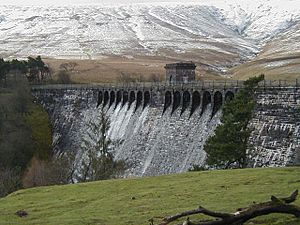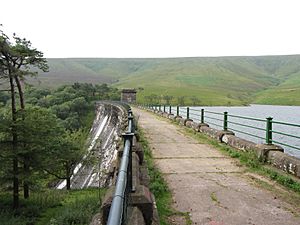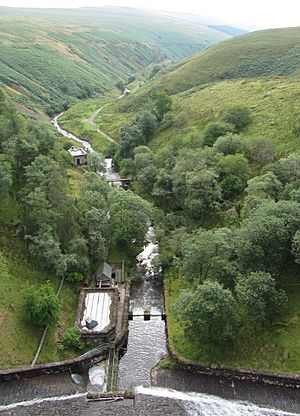Grwyne Fawr Reservoir facts for kids
Quick facts for kids Grwyne Fawr Reservoir |
|
|---|---|
 |
|
| Location | Brecon Beacons, Wales |
| Coordinates | 51°58′12″N 3°7′14″W / 51.97000°N 3.12056°W |
| Type | Reservoir |
| Primary outflows | Grwyne Fawr |
| Basin countries | United Kingdom |
| Water volume | 400,000,000 imperial gallons (1,800 megalitres) |
| Surface elevation | 1,725 feet (526 m) |
The Grwyne Fawr Reservoir is a large lake built by people in the Brecon Beacons National Park in Wales. It sits in the beautiful valley of the Grwyne Fawr river. This reservoir was finished in 1928. It can hold a huge amount of water, about 400 million imperial gallons (1,800 Ml).
Contents
Building the Reservoir
By the late 1800s, many towns in the western part of Monmouthshire had a big problem. They didn't have enough clean water. More and more people were moving there because of the growing steel and coal industries. Getting water to these towns was tricky because they were high up in the mountains.
Engineers chose the Grwyne Fawr valley for a new reservoir. It was 1,725 feet (526 m) above sea level. This high spot was perfect because water could flow downhill by itself to places like Abertillery. This meant no expensive pumps were needed.
Starting the Work
Building started in 1912, but there were problems right away. The road built up the valley wasn't strong enough. Heavy machines used to carry materials couldn't use it. So, they decided to build a special railway line instead. However, talks with local landowners didn't go well, and the railway wasn't finished. Then, World War I began, and all work had to stop.
The Workers' Village
Work on the reservoir started again in January 1919. The railway was finally completed and connected to the main train line at Llanvihangel Crucorney. A whole village grew up in the valley at Blaen-y-cwm for the construction workers and their families.
About 300 people lived there. It was like a small town with everything they needed:
- A hostel for workers
- A canteen for meals
- A day school for children
- A police station
- A small hospital
Building the Dam
The workers dug out 200,000 tons of sandstone from a nearby quarry. They used this stone to build the huge dam. Giant rocks, some weighing up to 5 tons, were set in concrete. The dam is 130 feet (40 m) thick at its base. The outside walls were carefully built with cut stone.
A 16-inch (41 cm) wide steel pipe was laid through a tunnel in Coity Mountain. This pipe carried water to a smaller reservoir in Cwmtillery.
Completion and Cost
The dam was finally finished in February 1928. After that, the railway and all the buildings used for construction, including the workers' village, were quickly taken apart. The entire project cost about £1 million, which was a huge amount of money back then!
How the Reservoir Works Now
The Grwyne Fawr Reservoir is no longer used to supply drinking water. The company that manages water in Wales, Dŵr Cymru, decided to stop using it.
The land around the reservoir wasn't managed well. This caused a lot of peat (a type of soil) to wash into the water. This made the water discoloured and hard to clean. It became too expensive to fix the problem, so the reservoir was taken out of service for drinking water.
 | Dorothy Vaughan |
 | Charles Henry Turner |
 | Hildrus Poindexter |
 | Henry Cecil McBay |



